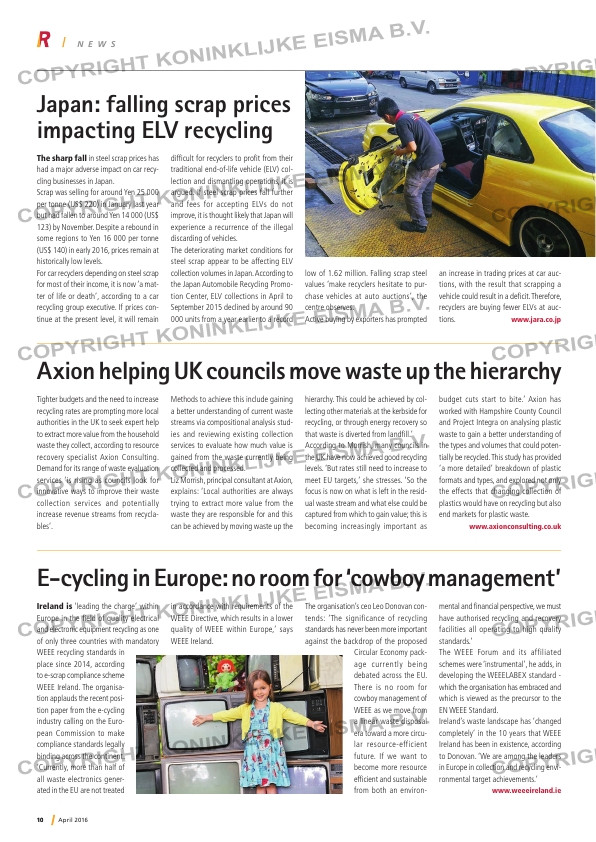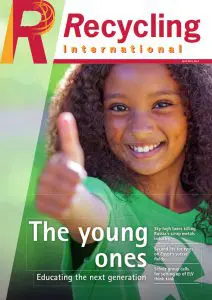Page 10 from: April 2016

10 April 2016
N E W S
Japan: falling scrap prices
impacting ELV recycling
The sharp fall in steel scrap prices has
had a major adverse impact on car recy-
cling businesses in Japan.
Scrap was selling for around Yen 25 000
per tonne (US$ 220) in January last year
but had fallen to around Yen 14 000 (US$
123) by November. Despite a rebound in
some regions to Yen 16 000 per tonne
(US$ 140) in early 2016, prices remain at
historically low levels.
For car recyclers depending on steel scrap
for most of their income, it is now ‘a mat-
ter of life or death’, according to a car
recycling group executive. If prices con-
tinue at the present level, it will remain
difficult for recyclers to profit from their
traditional end-of-life vehicle (ELV) col-
lection and dismantling operations, it is
argued. If steel scrap prices fall further
and fees for accepting ELVs do not
improve, it is thought likely that Japan will
experience a recurrence of the illegal
discarding of vehicles.
The deteriorating market conditions for
steel scrap appear to be affecting ELV
collection volumes in Japan. According to
the Japan Automobile Recycling Promo-
tion Center, ELV collections in April to
September 2015 declined by around 90
000 units from a year earlier to a record
low of 1.62 million. Falling scrap steel
values ‘make recyclers hesitate to pur-
chase vehicles at auto auctions’, the
centre observes.
Active buying by exporters has prompted
an increase in trading prices at car auc-
tions, with the result that scrapping a
vehicle could result in a deficit. Therefore,
recyclers are buying fewer ELVs at auc-
tions. www.jara.co.jp
E-cycling in Europe: no room for ‘cowboy management’
Ireland is ‘leading the charge’ within
Europe in the field of quality electrical
and electronic equipment recycling as one
of only three countries with mandatory
WEEE recycling standards in
place since 2014, according
to e-scrap compliance scheme
WEEE Ireland. The organisa-
tion applauds the recent posi-
tion paper from the e-cycling
industry calling on the Euro-
pean Commission to make
compliance standards legally
binding across the continent.
‘Currently, more than half of
all waste electronics gener-
ated in the EU are not treated
in accordance with requirements of the
WEEE Directive, which results in a lower
quality of WEEE within Europe,’ says
WEEE Ireland.
The organisation’s ceo Leo Donovan con-
tends: ‘The significance of recycling
standards has never been more important
against the backdrop of the proposed
Circular Economy pack-
age currently being
debated across the EU.
There is no room for
cowboy management of
WEEE as we move from
a linear waste disposal
era toward a more circu-
lar resource-efficient
future. If we want to
become more resource
efficient and sustainable
from both an environ-
mental and financial perspective, we must
have authorised recycling and recovery
facilities all operating to high quality
standards.’
The WEEE Forum and its affiliated
schemes were ‘instrumental’, he adds, in
developing the WEEELABEX standard –
which the organisation has embraced and
which is viewed as the precursor to the
EN WEEE Standard.
Ireland’s waste landscape has ‘changed
completely’ in the 10 years that WEEE
Ireland has been in existence, according
to Donovan. ‘We are among the leaders
in Europe in collection and recycling envi-
ronmental target achievements.’
www.weeeireland.ie
Axion helping UK councils move waste up the hierarchy
Tighter budgets and the need to increase
recycling rates are prompting more local
authorities in the UK to seek expert help
to extract more value from the household
waste they collect, according to resource
recovery specialist Axion Consulting.
Demand for its range of waste evaluation
services ‘is rising as councils look for
innovative ways to improve their waste
collection services and potentially
increase revenue streams from recycla-
bles’.
Methods to achieve this include gaining
a better understanding of current waste
streams via compositional analysis stud-
ies and reviewing existing collection
services to evaluate how much value is
gained from the waste currently being
collected and processed.
Liz Morrish, principal consultant at Axion,
explains: ‘Local authorities are always
trying to extract more value from the
waste they are responsible for and this
can be achieved by moving waste up the
hierarchy. This could be achieved by col-
lecting other materials at the kerbside for
recycling, or through energy recovery so
that waste is diverted from landfill.’
According to Morrish, many councils in
the UK have now achieved good recycling
levels. ‘But rates still need to increase to
meet EU targets,’ she stresses. ‘So the
focus is now on what is left in the resid-
ual waste stream and what else could be
captured from which to gain value; this is
becoming increasingly important as
budget cuts start to bite.’ Axion has
worked with Hampshire County Council
and Project Integra on analysing plastic
waste to gain a better understanding of
the types and volumes that could poten-
tially be recycled. This study has provided
‘a more detailed’ breakdown of plastic
formats and types, and explored not only
the effects that changing collection of
plastics would have on recycling but also
end markets for plastic waste.
www.axionconsulting.co.uk



